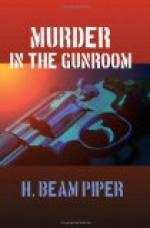“I’ll take it.” He dug out his billfold and extracted three twenties. “Nice clean condition; clean it up yourself?”
“Why, no. Mr. Rivers got it like this. As I said, it’s supposed to have been a family heirloom, but from the way it’s been cared for, I would have thought it had been in a collection,” the clerk replied. “Shall I wrap it for you?”
“Yes, if you please.” Rand followed him to the rear, laying aside his coat and hat. Gillis got some heavy paper out of a closet and packaged it, then hunted through a card-file in the top drawer of the desk, until he found the card he wanted. He made a few notes on it, and was still holding it and the sixty dollars when he rejoined Rand by the fire.
In spite of his effeminate appearance and over-refined manner, the young fellow really knew arms. The conversation passed from Confederate revolvers to the arms of the Civil War in general, and they were discussing the changes in tactics occasioned by the introduction of the revolver and the repeating carbine when the door from the house opened and Arnold Rivers appeared on the landing.
He looked older than when Rand had last seen him. His hair was thinner on top and grayer at the temples. Never particularly robust, he had lost weight, and his face was thinner and more hollow-cheeked. His mouth still had the old curve of supercilious insolence, and he was still smoking with the six-inch carved ivory cigarette-holder which Rand remembered.
He looked his visitor over carefully from the doorway, decided that he was not soliciting magazine subscriptions or selling Fuller brushes, and came down the steps. As he did, he must have recognized Rand; he shifted the cigarette-holder to his left hand and extended his right.
“Mr. Rand, isn’t it?” he asked. “I thought I knew you. It’s been some years since you’ve been around here.”
“I’ve been a lot of places in the meantime,” Rand said.
“You were here last in October, ’41, weren’t you?” Rivers thought for a moment. “You bought a Highlander, then. By Alexander Murdoch, of Doune, wasn’t it?”
“No; Andrew Strahan, of Edzel,” Rand replied.
Rivers snapped his fingers. “That’s right! I sold both of those pistols at about the same time; a gentleman in Chicago got the Murdoch. The Strahan had a star-pierced lobe on the hammer. Did you ever get anybody to translate the Gaelic inscription on the barrel?”
“You’ve a memory like Jim Farley,” Rand flattered. “The inscription was the clan slogan of the Camerons; something like: Sons of the hound, come and get flesh! I won’t attempt the original.”
“Mr. Rand just bought 6524, the Leech & Rigdon .36,” Gillis interjected, handing Rivers the card and the money. Rivers looked at both, saw how much Rand had been taken for, and nodded.
“A nice item,” he faintly praised, as though anything selling for less than a hundred dollars was so much garbage. “Considering the condition in which Confederate arms are usually found, it’s really first-rate. I think you’ll like it, Mr. Rand.”




